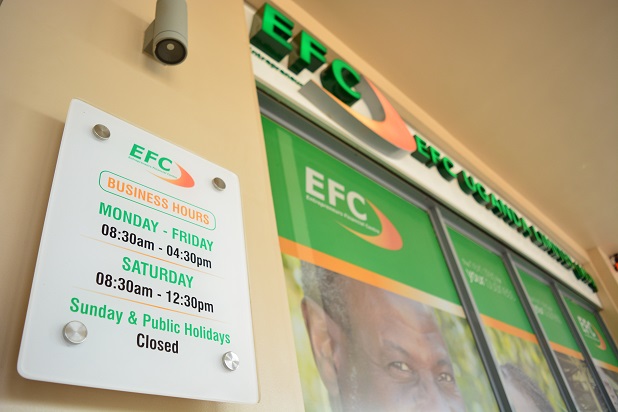EFC Uganda offices
The Bank of Uganda (BoU) has effective today, 19th January 2024, placed EFC Uganda Limited under liquidation, revoked its license, and ordered for the winding up of its affairs.
This is in exercise of its powers under Sections 72 (1) and 12 (1) (d) & (g) of the Microfinance Deposit-taking Institutions (MDI) Act, 2003 as amended.
“This action has been taken because Bank of Uganda has determined that the continuation of EFC Uganda Limited’s activities is detrimental to the interests of its depositors due to the institution’s failure to resolve its significant undercapitalization and poor corporate governance,” Michael Atingi-Ego, the Deputy Governor, Bank of Uganda, said.
He says Bank of Uganda and the Deposit Protection Fund of Uganda will inform depositors of the arrangements that will be put in place to enable them to access all of their deposits.
“All other creditors are requested to submit their claims to the Office of the Director Financial Stability, Bank of Uganda within 30 days from the date of this statement,” Atingi-Ego said on Friday morning.
He added: “All borrowers of EFC Uganda Limited must continue to service their loan obligations by making payments at Bank of Uganda offices and branches.Any person possessing property of EFC Uganda Limited should deliver it to Bank of Uganda and hand it over to the Office of the Director, Financial Stability.’
BoU says in accordance with Section 69 of the Act, no steps may be taken by any person to enforce any security over the property of EFC Uganda Limited (MDI) and no other proceedings or execution of legal process may be commenced or continued against the institution or its property.
It should be noted that the BoU increased the minimum paid-up capital for commercial banks up to Shs120 billion, and credit institutions of Shs20 billion by 31st December 2022. These capital thresholds will be further raised up to Shs150 billion for commercial banks and Shs25 billion for credit institutions by 30th June 2024.
For microfinance deposit taking institutions, capital requirements were increased from Shs500m to Shs10bn.
A number of financial institutions have been struggling to meet the new capital requirements, a thing that will lead to mergers and acquisitions especially of smaller institutions.
As of December 2021, EFC owned assets of Shs112.8 billion, with shareholders’ equity of Shs12.982 billion.
In October 2023, EFC Uganda announced the closure of five branches including Kireka, Mukono, Nateete, Kalerwe and Nansana in a move the company said was “to help streamline business processes while leveraging on partnerships in the banking sector.”
EFC’s shareholders consist of a group of world organizations including Développement international Desjardins (DID), which is a subsidiary of Desjardins Group (the leading financial cooperative group in Canada and sixth largest in the world), AfricInvest Financial Sector Limited (AFS), the Belgian Investment Company for Developing Countries (BIO), and Uganda Gatsby Trust.






